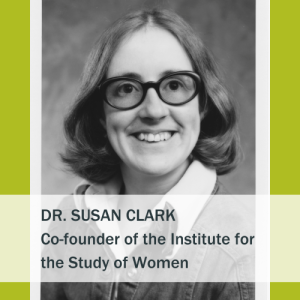In 1973, the first women’s studies course emerged at Mount Saint Vincent University. Led by Dr. Susan Clark, Dr. Rosemary Sampson, and Dr. David Monaghan, it laid the foundation for a revolution of thought.
 Just nine years later, in 1982, Dr. Susan Clark and Dr. Wayne Ingalls, approached then President of MSVU Dr. E. Margaret Fulton with a groundbreaking proposal. Their vision was for an Institute for the Study of Women. A place and program of research and advocacy dedicated to what they described as unraveling the complexities of womanhood, illuminating the paths toward social justice.
Just nine years later, in 1982, Dr. Susan Clark and Dr. Wayne Ingalls, approached then President of MSVU Dr. E. Margaret Fulton with a groundbreaking proposal. Their vision was for an Institute for the Study of Women. A place and program of research and advocacy dedicated to what they described as unraveling the complexities of womanhood, illuminating the paths toward social justice.
At that time, the academic landscape was evolving under the visionary leadership of President Fulton. She was dedicated to feminism and had a mission to broaden the horizons of education, to weave the threads of women’s studies into the fabric of academia. And so, the proposal was promptly approved.
With unwavering and broad support, the Institute sprang into existence. For Dr. Clark, the Institute was not just a concept – it was a testament to the tireless pursuit of progress. As the former Dean of Human & Professional Development, she was committed to an interdisciplinary approach to the Institute’s research and advocacy and sought to push its development accordingly.
With each passing year, the Institute flourishes, its name evolving to mirror the shifting tides of feminism. From the Institute for the Study of Women to the Institute for Women, Gender, and Social Justice, its essence has remained unchanged—an unwavering commitment to equity and enlightenment.
In 2013, a momentous occasion heralded the Institute’s transformation, as it was renamed in honour of Dr. Alexa McDonough, a titan of activism and advocacy. It is now called The Alexa McDonough Institute for Women, Gender and Social Justice. Alexa’s legacy, a testament to the power of perseverance, breathed new life into the Institute, infusing it with a renewed sense of purpose that will continue to echo through the ages.
As Dr. Clark said recently, “This is a testament to Alexa’s commitment to social justice and a further indication of the continuing importance of the Institute’s work”.